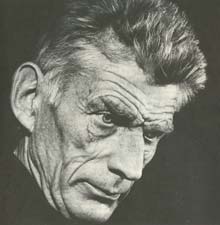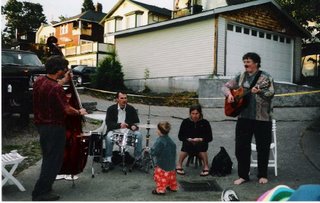Archives
- 01/01/2004 - 02/01/2004
- 02/01/2004 - 03/01/2004
- 03/01/2004 - 04/01/2004
- 04/01/2004 - 05/01/2004
- 05/01/2004 - 06/01/2004
- 06/01/2004 - 07/01/2004
- 07/01/2004 - 08/01/2004
- 08/01/2004 - 09/01/2004
- 09/01/2004 - 10/01/2004
- 10/01/2004 - 11/01/2004
- 11/01/2004 - 12/01/2004
- 12/01/2004 - 01/01/2005
- 01/01/2005 - 02/01/2005
- 02/01/2005 - 03/01/2005
- 03/01/2005 - 04/01/2005
- 04/01/2005 - 05/01/2005
- 05/01/2005 - 06/01/2005
- 06/01/2005 - 07/01/2005
- 07/01/2005 - 08/01/2005
- 08/01/2005 - 09/01/2005
- 09/01/2005 - 10/01/2005
- 10/01/2005 - 11/01/2005
- 11/01/2005 - 12/01/2005
- 12/01/2005 - 01/01/2006
- 01/01/2006 - 02/01/2006
- 02/01/2006 - 03/01/2006
- 03/01/2006 - 04/01/2006
- 04/01/2006 - 05/01/2006
- 05/01/2006 - 06/01/2006
- 06/01/2006 - 07/01/2006
- 07/01/2006 - 08/01/2006
- 08/01/2006 - 09/01/2006
- 09/01/2006 - 10/01/2006
- 10/01/2006 - 11/01/2006
- 11/01/2006 - 12/01/2006
- 12/01/2006 - 01/01/2007
- 01/01/2007 - 02/01/2007
- 02/01/2007 - 03/01/2007
- 03/01/2007 - 04/01/2007
- 04/01/2007 - 05/01/2007
- 05/01/2007 - 06/01/2007
- 06/01/2007 - 07/01/2007
- 07/01/2007 - 08/01/2007
- 08/01/2007 - 09/01/2007
- 09/01/2007 - 10/01/2007
- 10/01/2007 - 11/01/2007
- 11/01/2007 - 12/01/2007
- 12/01/2007 - 01/01/2008
- 01/01/2008 - 02/01/2008
- 02/01/2008 - 03/01/2008
- 03/01/2008 - 04/01/2008
- 04/01/2008 - 05/01/2008
- 05/01/2008 - 06/01/2008
- 06/01/2008 - 07/01/2008
- 07/01/2008 - 08/01/2008
- 08/01/2008 - 09/01/2008
- 09/01/2008 - 10/01/2008
- 11/01/2008 - 12/01/2008
- 01/01/2009 - 02/01/2009
- 04/01/2009 - 05/01/2009
- 07/01/2009 - 08/01/2009
- 09/01/2009 - 10/01/2009
- 10/01/2009 - 11/01/2009
- 11/01/2009 - 12/01/2009
- 12/01/2009 - 01/01/2010
- 03/01/2010 - 04/01/2010
Utopian Turtletop. Monsieur Croche's Bête Noire. Contact: turtletop [at] hotmail [dot] com
Friday, September 29, 2006
"Daddoo, may I use a pen?"
* * *
My friend Jay’s parents were in town the other night and they took my family to dinner. Mary is a retired drama teacher, and she engaged Fingers Hilarity in a story-telling exercise, “Let’s tell a story. I’ll say a sentence and then you say a sentence.”
Fingers had such a good time, we played the game again last night.
“You start,” he said.
I always had to start.
“Once there was a little boy.”
“And he liked to play ball in the house.”
Every story started like that. The second one started:
“Once there was a little girl.”
“And she liked to play ball in the house.”
Number three started this way:
“Once there was a mamu and a daddoo.”
“And they liked to play ball in the house.’
And number four:
“Once there was a mouse and a guinea pig.”
“And they liked to play ball in the house.”
It was great to see Jay’s parents. People I’ve known since before I can remember. They helped a lot with Dad’s funeral.
And I have Mary to thank for inspiring these excellent stories.
* * *
My friend Jay’s parents were in town the other night and they took my family to dinner. Mary is a retired drama teacher, and she engaged Fingers Hilarity in a story-telling exercise, “Let’s tell a story. I’ll say a sentence and then you say a sentence.”
Fingers had such a good time, we played the game again last night.
“You start,” he said.
I always had to start.
“Once there was a little boy.”
“And he liked to play ball in the house.”
Every story started like that. The second one started:
“Once there was a little girl.”
“And she liked to play ball in the house.”
Number three started this way:
“Once there was a mamu and a daddoo.”
“And they liked to play ball in the house.’
And number four:
“Once there was a mouse and a guinea pig.”
“And they liked to play ball in the house.”
It was great to see Jay’s parents. People I’ve known since before I can remember. They helped a lot with Dad’s funeral.
And I have Mary to thank for inspiring these excellent stories.
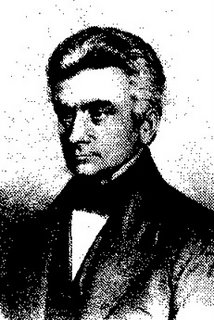 "Every composer should be his own Carver"
"Every composer should be his own Carver"-- William Billings, American composer, 1746 - 1800.
He wrote a hymn during the Revolutionary War that was an early contender to become America's national anthem. It's called "Chester,"after the name of a town called Chester, though the link between the song and the title is obscure. It is a stately, nice, but somewhat stodgy tune. I'd like to hear more by him.
Thursday, September 28, 2006
ENTER GODOT
New Yorkers, mark your calendars. Coming on 2 years ago I posted my version of the story of how my friends and I wrote a monologue for Godot’s entrance, to sabotage a painfully bad production of Beckett’s great play. My friend Ross Lipman, whose idea the monologue was, has written a lovely and thoughtful account of the event, and he will be reading it at an event not-to-be-missed in New York on Wednesday, October 11. The third “Godot” co-author, my old housemate Jeff Dorchen, who was going to play Godot, found a copy of our script and has recorded it for inclusion in Ross’s reading.
Ross’s piece meditates on the nature of theatrical transgression and the power of the fourth wall. At that time, my crowd had staged a number of political guerrilla theater events, including some we could have been arrested for, and yet we didn’t have the gumption to disrupt a “criminally” stupid (and professional -- which made it a “legitimate” target for us) production of Waiting for Godot. (Be warned: Ross’s piece includes an embarrassingly flattering description of me which I don’t endorse, though my vanity does.)
The main ringleader of our two biggest guerrilla theater pieces was my friend Andrew Boyd, who went on to found Billionaires for Bush. He will be showing a new video, which I haven’t seen, at this New York event, called “THE OIL ENFORCEMENT AGENCY: BEHIND THE CONTROVERSY.”
The evening will also include Ross’s prescient video of one of our college street theater pieces, which Andrew conceived and for which I was one of the writers, a grand utopian project to provide free bikes for anybody to use in Ann Arbor. We commenced the project with a public exorcism -- Andrew’s idea -- religiously driving the demon of commodity value from the bikes. Ross’s video anticipates many of the techniques of Michael Moore’s documentary style -- it’s very funny, and he interviews many of the people who destroyed the bikes, and they’re very funny, sometimes inadvertantly. The exorcism is in the video, so I’m in it, as one of the exorcists. A 21-year-old, skinny and sideburned version of me.
Ross’s “Green Bikes” documentary includes fake documentary footage of a low-key televangelist who is exorcising the demon of complexity from the TV screen -- Ross’s ahead-of-its-time critique of the rise of fundamentalism. The exorcist is brilliantly played by my old roommate Danny Thompson, who half-improvised his lines. I mention this because Danny will have a piece in this not-to-be-missed evening (did I mention that this evening is not to be missed?), one of his hilarious puppet shows, purportedly Samuel Beckett’s first play, written at age six, “HAPPY HAPPY BUNNY MEETS SAD SAD OWL,” which was originally produced as part of The Complete Lost Works of Samuel Beckett as Found in an Envelope (Partially Burned) in a Dustbin in Paris Labeled “Never to Be Performed. Never. Ever. EVER! Or I’ll Sue! I’LL SUE FROM THE GRAVE!!!” For reviews of which, see here. And also this -- completely true -- endorsement from New City paper in Chicago: “Danny Thompson's puppetry is so funny it hurts.” I saw “HAPPY HAPPY BUNNY MEETS SAD SAD OWL” in its original run, and not only is it one of the funniest things I have ever seen, but part of what makes it hilarious is that Danny really “gets” Beckett.
Rounding out the evening is video footage, which I have not seen, of another old roommate, and another ringleader of the guerrilla theater pieces, Michael Barrish. He is in the Green Bikes video as well, as is Andrew, prominently.
Politics, philosophical meditation on theater, and hilarity. I wish I could go -- old home week!
Details:
Wed Oct 11 7pm
Pioneer Theater
East 3rd Street, between Avenues A and B (closer to A)
New York City * USA
showtimes (212) 591 0434
advance tickets: click by showtime or call (800) 595 4849
http://www.twoboots.com/pioneer/
Wednesday, September 27, 2006
My friend John Logie weighs in on the Dylan-Timrod shenanigans, astutely saying, “I hope to hell Dylan sees fit to plagiarize my book once it's out.”
(He also links to my band’s web page and refers to me as an “accomplished songwriter” -- hey, thanks!)
* * *
Usage note: To rank cultural artifacts according to their correspondence with brow elevation -- "highbrow" v. "lowbrow" -- with few people admitting to being "middlebrow" -- is to show a sensibility out-of-date with intellectual fashion. The "brows" date back to the discredited (and racist) quackery of phrenology. Some scholars say that the people who popularized the adoption of "highbrow" and "lowbrow" into cultural contexts about 100 years ago originally meant it tongue-in-cheek. When I come across it now on blogs I like very much, I hope the authors intend to keep the tongue-in-cheek quality, but I'm not sure I see it.
I pondered a replacement for terms like "high art" and "serious art" and "fine art" and "highbrow." The only word that's making it for me is "esoteric". The etymology of "esoteric" points toward "inner," as in "inner circle" -- the chosen few. The implied exclusiveness does not bother me, because in our world the "few" can be self-selecting. The door's open; anyone is welcome, but few choose. Height, fineness, seriousness, and brows have nothing to do with it.
(He also links to my band’s web page and refers to me as an “accomplished songwriter” -- hey, thanks!)
* * *
Usage note: To rank cultural artifacts according to their correspondence with brow elevation -- "highbrow" v. "lowbrow" -- with few people admitting to being "middlebrow" -- is to show a sensibility out-of-date with intellectual fashion. The "brows" date back to the discredited (and racist) quackery of phrenology. Some scholars say that the people who popularized the adoption of "highbrow" and "lowbrow" into cultural contexts about 100 years ago originally meant it tongue-in-cheek. When I come across it now on blogs I like very much, I hope the authors intend to keep the tongue-in-cheek quality, but I'm not sure I see it.
I pondered a replacement for terms like "high art" and "serious art" and "fine art" and "highbrow." The only word that's making it for me is "esoteric". The etymology of "esoteric" points toward "inner," as in "inner circle" -- the chosen few. The implied exclusiveness does not bother me, because in our world the "few" can be self-selecting. The door's open; anyone is welcome, but few choose. Height, fineness, seriousness, and brows have nothing to do with it.
Tuesday, September 26, 2006

I had scored the concrete with the circular saw, and when the sledge tapped the edge off clean, the word "Beautiful!" popped from my body, and I realized it was exactly what Dad would have said.
Monday, September 25, 2006
 A while back Scott at Rockcritics Deli posted a list of favorite music books, and I’ve been wanting to do one since.
A while back Scott at Rockcritics Deli posted a list of favorite music books, and I’ve been wanting to do one since.The Jazz Tradition by Martin Williams. This book taught me more about listening than any other, partly because I read it so early. Williams preaches the twin gospels of rhythm and structure. Wise about music, life, improvisation, and democracy.
The Nashville Sound: Bright Lights and Country Music by Paul Hemphill. I put Williams first out of loyalty to first love, but this is probably my favorite music book ever written: a loving and witty reporter’s survey of the country music scene circa 1969 from the television studios of Glenn Campbell and Johnny Cash to backwoods fiddle players who build their own instruments.
Lyrics on Several Occasions: A Selection of Stage and Screen Lyrics Written for Sundry Situations; and Now Arranged in Arbitrary Categories To Which Have Been Added Many Informative Annotations and Disquisitions on Their Why and Wherefore, Their Whom-For, Their How; and Matters Associative by Ira Gershwin. The lyrics are great, but that is not the reason to read the book. His commentaries are wise, witty, treasurable snapshots of life, friendship, music, and song.
Rock from the Beginning by Nik Cohn. Zip flash witty partisan Pop! Wacky that he’s almost as interested in bands’ managers as he is in the bands. Still the best history of rock, but it’s hard to compete because it stops at 1969.
Music Is My Mistress by Duke Ellington. Eloquent, grand, witty, warm, musically astute, laugh-out-loud funny at times -- what a life, what music.
The American Songbag by Carl Sandburg. An astonishing collection of songs, and Sandburg’s quirky, folksy, faux-folksy, erudite, witty, wise commentary influenced Pete Seeger and Woody Guthrie’s personas and prose. Unfortunately Garrison Keillor wrote the introduction to the currently available edition, and he neither respects Sandburg nor understands his milieu; it boggles me that the publisher hired someone to trash the book with an unnecessary introduction.
Mystery Train: Images of America in Rock ‘N’ Roll Music by Greil Marcus. Inspired and prophetic. His description of bands as “images of community” anticipates Christopher Small’s notion that musicking is about relationships.
Exotica: Fabricated Soundscapes in a Real World by David Toop. Gorgeous dreamwork and reporting on musical exotica, local and international.
A Little Night Music: Discoveries in the Exploitation of an Art by Gerald W. Johnson. 1937. A reporter takes up the flute and joins a neighborhood classical ensemble. Hilarious and interesting polemic about the importance of making your own music, however badly.
Elevator Music: A Surreal History of Muzak, Easy-Listening and other Moodsong by Joseph Lanza. The best discussion I know of how the ubiquity of recording changed the experience of music listening, plus an entertaining polemic on how background music is also better than the other kind (that so-called other kind, which most of us consume as background music most of the time).
The Recording Angel: The Experience of Music from Aristotle to Zappa by Evan Eisenberg. Fantastic reporting on record collecting extremists, plus beautiful meditations on music and how recording changed it.
A Year From Monday by John Cage. Open your ears! It’s the two beautiful pieces on Ives that shifted the nature of my being: preaching the gospel of multiplicity.
The Incompleat Folksinger by Pete Seeger. This collection of magazine articles by the pope of “folk” music is a lot of fun to read; it includes poignant reminiscences about barnstorming with Woody Guthrie.
Born to Win by Woody Guthrie. The most audacious and wide-ranging song lyricist of the 20th century unwinds in prose and poetry.
The Glenn Gould Reader. Witty and musically deep, and with a cold, bright tone reminiscent of his piano sound; preaching the gospel of counterpoint.
Music Ho! by Constant Lambert. 1934. An English composer surveys the scene perceptively and very wittily from a classical-centric but open-minded perspective (and marred by occasional racism).
Stomp and Swerve: American Music Gets Hot, 1843-1924 by David Wondrich. Zippy, passionate history of the evolution of popular music from minstrelsy to jazz and country.
After the Ball: Pop Music from Rag to Rock by Ian Whitcomb. Begins near the end of Wondrich’s book, with similar perspective. Whitcomb’s English; he had a fluke rock-pop hit during the British Invasion, but he’s partial to the Tin Pan Alley tradition, and he locates rock as part of the continuum.
They’re Playing Our Song: From Jerome Kern to Stephen Sondheim -- the stories behind the words and music of two generations by Max Wilk. Warm profiles of Tin Pan Alley songwriters.
The Street Where I Live by Alan Jay Lerner. Grand, witty, and rueful elegy for a bygone showbiz era, by the lyricist of My Fair Lady and Camelot.
Grown Up All Wrong: 75 Great Rock and Pop Artists from Vaudeville to Techno by Robert Christgau. The most compulsively readable of rock critics; passionate and wise about music and politics and culture and life.
Noise: The Political Economy of Music by Jacques Attali, trans. from the French by Brian Massumi. A book by an economist: mind-re-orienting on music-as-politics.
Music Reviewed 1940-1954 by Virgil Thomson. I really disliked his polemical book The State of Music, but it led to Thomson getting this gig as a regular newspaper reviewer of classical music, which revealed him as the Pauline Kael of classical reviewing -- pithy, omnivorous, enthusiastic, and occasionally harsh.
Jazz Is by Nat Hentoff. First amendment scholar and activist, jazz record producer, and street corner existentialist, Hentoff knew the jazz titans of the ‘50s and ‘60s and wrote about them beautifully.
Black Music by Leroi Jones. His liner notes to Coltrane’s Live at Birdland are gorgeously enlivening, and his defense of Dionne Warwick is surprising and heartening.
Louie Louie: The History and Mythology of the World’s Most Famous Rock ‘n’ Roll Song; Including the Full Details of Its Torture and Persecution at the Hands of the Kingsmen, J. Edgar Hoover’s F.B.I., and a Cast of Millions; and Introducing, for the First Time Anywhere, the Actual Dirty Lyrics by Dave Marsh. An astounding history of a great record and a durable, versatile song, told like a detective thriller.
Jazz Panorama: From the Pages of the Jazz Review, edited by Martin Williams. Portraits and reviews; the profile of Lester Young breaks your heart while Young’s devastating conversational style presages Bob Dylan’s evasive hipster persona.
Chronicles Volume One by Bob Dylan. Dylan as a memoirist is as full of baloney and evasive and fascinating as ever, and more loving and generous than had ever been his artistic wont.
Beneath the Underdog by Charles Mingus. Outlandish and oversized, pained, observant, and hilarious; as volatile as his music.
Running with the Devil: Power, Gender, and Madness in Heavy Metal Music by Robert Walser. Preaching the gospel that people always love music for many reasons, always including musical ones. Great ethnographical insights into the milieus of different musical styles.
Feminine Endings: Music, Gender, and Sexuality by Susan McClary. McClary’s feminist approaches to harmony and musical structure are challenging and worthwhile whether you end up agreeing or not.
The Singer and the Song by Gene Lees. Eccentric, erudite, passionate, warm, highly readable essays on songwriting and lyrics, and good profiles of songwriters and singers.
Old Troubadour: Carl Sandburg with his Guitar Friends by Gregory d’Alessio. A warm and loving memoir of Sandburg as amateur singer and guitarist and guitar aficionado, written by a friend and amateur classical guitarist who knew Segovia.
Riding on a Blue Note by Gary Giddins. His bio of Satchmo is terrific as well, as is his omnibus Visions of Jazz, but this collection includes an interesting and persuasive counter-history to the myth that jazz was born in New Orleans and travelled upriver, which I haven’t seen elsewhere.
Country: Living Legends and Dying Metaphors in America's Biggest Music by Nick Tosches. Harsh and vivid and learned.
Friday, September 22, 2006
Just got back from seeing the Beach Boys for five bucks (the kid got in free) at the Western Washington Fair in Puyallup. Mike is the last Boy standing, of the originals. I'd expected to see Al too, but he wasn't there. Bruce -- not quite an original -- was there. Mike's corny jokes remain charmingly corny (I'd never seen him, but I've seen footage), and he seems bored -- at least one of the songs he sang -- "409" -- is older than me, and I was born in '63. On the early hits he sounded more nasally than ever, but he sang his bass parts fine and his smooth parts fine. He was tender on his big song of vindication, "Kokomo," the #1 hit song he wrote and recorded without Brian Wilson, after Brian left the band. Near the end of the show it became ALL TOP FIVE HITS -- I Get Around (#1), Good Vibrations (#1), Barbara Ann (#2), Help Me Rhonda (#1), California Girls (#3), and closing with Surfin' USA (#3), the Chuck Berry song (Sweet Little 16, not as good a song) that Brian wrote new words for. Then the encore, Kokomo (#1) and Fun Fun Fun (#5). I never much liked "California Girls," but it worked great live -- and -- so perfect, so corny -- near the end, Mike shouted "Washington State girls!" -- and the crowd -- which was jam packed, with youngsters and oldsters all rocking together -- the crowd erupted. Underlining Washington State's anamolous position as one of two states that has "State" as part of its nickname -- rock stars don't say, "Hello Montana State!" or "Hello Rhode Island State!" Washington and New York are the only states that are overshadowed mythically by cities with identical names; hence, Washington State, New York State.
Hello, Mike Love!
The jam-packed crowd overshadowed the crowd for Brian Wilson that I saw at the same venue for the same price 5 or 6 years ago, and I realized -- the Beach Boys are more famous. The shows are similar, with Mike's band emphasizing the pre-Pet Sounds songs more than Brian's band, and Brian's band vice versa, but both bands featuring both. I don't blame people for preferring to see Mike -- his voice has deteriorated less. And he's got the brand name. "Brian Wilson" is the brand name for people who read the credits. I happen to be one of those people, but who cares. Brian's set included "Add Some Music to Your Day," and at the great climactic line, "MUSIC IS IN MY SOUL," I cried. This is my religion.
Recently I praised the Beach Boys' lyrics, omitting to mention my dislike for many of them, "California Girls" being one, the silly generalizations about geography and women; "Salt Lake City" having maybe the worst line -- "and girl for girl they've got the cutest in the western states, yeah" -- it's like, can you be more fetishistically pseudo-quantificatory about something inherently non-quantifiable, please? It always reminds me of line 283 of Milton's masque Comus, And left your fair side all unguarded, lady? (I had to look up which number the line is.) Milton, that ridiculous padder, stretching the syllables to make the pentameter when all he means to say is, "And left you unguarded, ma'am?" -- and instead this ridiculous line -- your fair side -- makes me ask, what about the rest of her? Or is it the side that's particularly important, like a side of beef? Really, Jerry Lewis should deliver the line -- And left your fair side all unguarded, lady? -- then it would work. Woman as commodity -- "girl for girl" -- Brian Wilson, (presumably) accidental Miltonesque (flattering neither).
Not being a car fetishist, the car fetish songs leave me un-excited too, though I admire the exuberance and skill. Also, note words like "dig" and "groovy" and "hip" in songs from circa 1965.
Enjoyed the show. Excellent Beach Boys tribute band, very good group singing, very good falsetto singer (whoever he was) doing Brian's famous parts. Touched by Bruce's rendition of "God Only Knows," dedicated to "the late, great Carl Wilson"; those gorgeous interwoven wordless vocals in the middle of the song -- I cried, as the 3-year-old, sitting on my knee (his mom was at home with a cold), said, coincidentally, "Daddoo, it's too loud, I want to go." All those arrangements still sound wonderful. Needless to say, there's no sense of discovery in the presentation, but nobody seems to mind, and it made me question the value of "a sense of discovery." Ultimately, just because Mike Love's daddy and Brian Wilson's daddy (and my daddy) have passed away and he can't take the T-Bird away anymore, it doesn't mean we can't still have fun fun fun.
Thursday, September 21, 2006
SINGER-SONGWRITERS
 Fats Waller, the great songwriter, pianist, and singer. "Ain't Misbehavin'," "Honeysuckle Rose," many more.
Fats Waller, the great songwriter, pianist, and singer. "Ain't Misbehavin'," "Honeysuckle Rose," many more.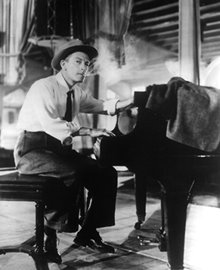 Hoagy Carmichael, songwriter, singer, pianist, movie star. "Up a Lazy River," "Stardust," many more.
Hoagy Carmichael, songwriter, singer, pianist, movie star. "Up a Lazy River," "Stardust," many more.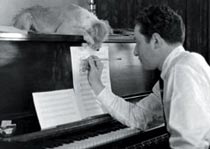 Harold Arlen, composer of "The Wizard of Oz" and scads of other standards; his version of "One For My Baby (And One More for the Road)" moves me more than Sinatra's.
Harold Arlen, composer of "The Wizard of Oz" and scads of other standards; his version of "One For My Baby (And One More for the Road)" moves me more than Sinatra's.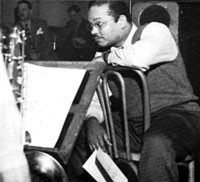 Arranger-composer for the Jimmie Lunceford and Tommy Dorsey big bands, Sy Oliver also was a smooth crooner of his own songs ("Dream of You").
Arranger-composer for the Jimmie Lunceford and Tommy Dorsey big bands, Sy Oliver also was a smooth crooner of his own songs ("Dream of You").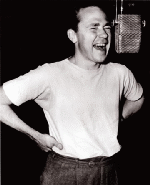 Johnny Mercer, business mogul (Capitol Records), hit singer, occasional and fine composer ("Dream," "Something's Gotta Give"), and one of my favorite lyricists ("One For My Baby," "Too Marvelous for Words," "Moon River," buckets more).
Johnny Mercer, business mogul (Capitol Records), hit singer, occasional and fine composer ("Dream," "Something's Gotta Give"), and one of my favorite lyricists ("One For My Baby," "Too Marvelous for Words," "Moon River," buckets more).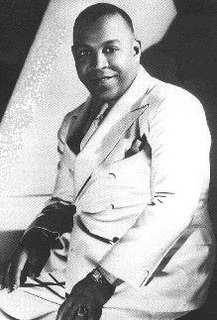 Don Redman's big band arrangements for Fletcher Henderson in the early '20s influenced Ellington and everybody; he also wrote great standards and sang them sweetly ("Gee Baby Ain't I Good to You").
Don Redman's big band arrangements for Fletcher Henderson in the early '20s influenced Ellington and everybody; he also wrote great standards and sang them sweetly ("Gee Baby Ain't I Good to You").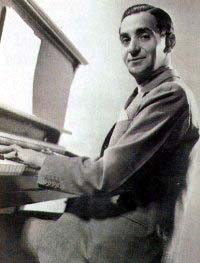 Irving Berlin was a singer before he was a songwriter.
Irving Berlin was a singer before he was a songwriter.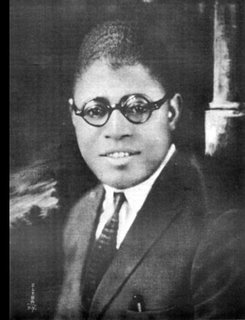 Clarence Williams, pianist and composer, played with Bessie Smith, Louis Armstrong, Sidney Bechet, and many others; some scholars dispute his songwriting credits, but he couldn't have stolen them all, and he sang strongly ("Baby Won't You Please Come Home").
Clarence Williams, pianist and composer, played with Bessie Smith, Louis Armstrong, Sidney Bechet, and many others; some scholars dispute his songwriting credits, but he couldn't have stolen them all, and he sang strongly ("Baby Won't You Please Come Home").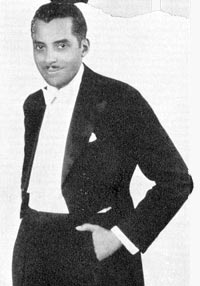 Noble Sissle, singing star from the 'teens, lyricist with composer Eubie Blake; most famous lyric is probably "I'm Just Wild About Harry."
Noble Sissle, singing star from the 'teens, lyricist with composer Eubie Blake; most famous lyric is probably "I'm Just Wild About Harry." The great Billie Holiday wrote some of her biggest hits ("God Bless the Child").
The great Billie Holiday wrote some of her biggest hits ("God Bless the Child").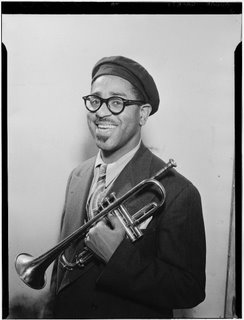 Dizzy Gillespie was a great scat singer and wrote some good songs ("He Beeped When He Should Have Bopped").
Dizzy Gillespie was a great scat singer and wrote some good songs ("He Beeped When He Should Have Bopped").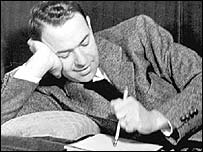 Yip Harburg wrote the lyrics for, among myriad others, "The Wizard of Oz" and "Brother Can You Spare a Dime?"; his recording of the latter reveals a good singer.
Yip Harburg wrote the lyrics for, among myriad others, "The Wizard of Oz" and "Brother Can You Spare a Dime?"; his recording of the latter reveals a good singer.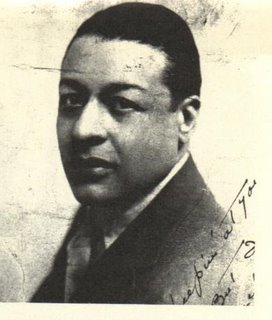 Minstrel and Broadway star Bert Williams wrote one of the great songs of the 20th century, "Nobody," as well as others.
Minstrel and Broadway star Bert Williams wrote one of the great songs of the 20th century, "Nobody," as well as others.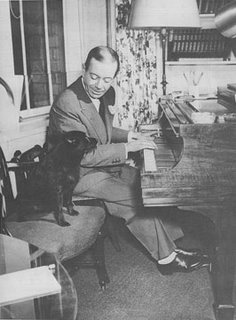 I'm always happy to hear Cole Porter sing his own songs.
I'm always happy to hear Cole Porter sing his own songs.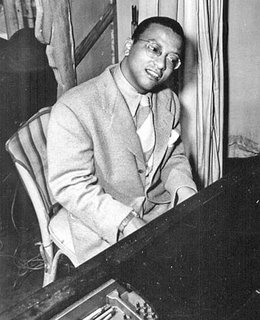 Billy Strayhorn's intonation wasn't perfect, but he drew a wry, pained humor out of his "Lush Life" that I've never heard anyone else find.
Billy Strayhorn's intonation wasn't perfect, but he drew a wry, pained humor out of his "Lush Life" that I've never heard anyone else find.The other singer-songwriters. They would make a killer 2-disc compilation, wouldn't they? (Whaddaya say, Jody?)
Other nominees more than welcome.
Wednesday, September 20, 2006
 It's a beautiful, enthralling book of lyrical ethical philosophy, so this passage jumped out unforgettably. Some American tourist must have been pulling Martin Buber's leg. Or he was pulling ours! I'm not pulling yours -- you could look it up.
It's a beautiful, enthralling book of lyrical ethical philosophy, so this passage jumped out unforgettably. Some American tourist must have been pulling Martin Buber's leg. Or he was pulling ours! I'm not pulling yours -- you could look it up.We greet those we encounter by wishing them well or by assuring them of our devotion or by commending them to God. But how indirect are these worn-out formulas ("Hail!" no longer suggests anything of the original bestowal of power) compared with the eternally young, physical, relational greeting of the Kaffir, "I see you!" or its American variant, the laughable but sublime "Smell me!"
-- Martin Buber, I and Thou, trans. Walter Kaufmann, p. 70
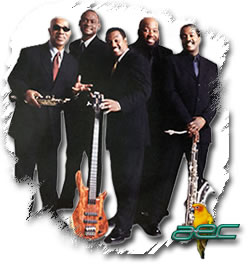 To last throughout the years (living forever) with Kool & the Gang.
To last throughout the years (living forever) with Kool & the Gang.It’s no coincidence that two of my blogging friends quoted the same sentence in Robert Christgau’s report, which I mentioned in this post, of seeing 32 shows in 30 days: “[R]ecords can't match the exhilaration of the best gigs. You walk home prepared to live forever.”
Ali Marcus singled the sentence out as the best thing in Christgau’s piece, while Carl Wilson quoted a lengthier passage but returned to this sentence at the close of his post with an emendation, “To live forever, at least for now.”
Carl’s notion of temporary immortality rhymes happily with a discussion that took place in comments to a post by Michael Berube on the paradox embedded in Kool & the Gang’s song “Celebration,” which describes itself as a “celebration to last throughout the years.” Commenter Sean Carroll (comment 16) argues that “it’s the spirit of an ongoing, even perpetual, celebration that irrupts into our lives on special occasions,” while Kip Manley (#20) elaborates,
A recently published book called This Is Your Brain on Music may have insight as to how music has the power to confer temporary immortality by allowing mortals such as us to dip our feet into the never-ending stream of celebration. According to this review in the “Seattle Times”, the book persuasively argues that “responses to music arise from the physical structure and electrochemical activity of the most primitive and the most highly evolved subsystems of that remarkable organ,” because music “involves every subsystem of the brain, including the primitive emotional centers, making it especially effective for bonding individuals to each other and to the group.”
(I was happily unsurprised to see the same “Seattle Times” review sitting by the computer of my friend Robert’s house when I went there for band practice last week. I love my band.)
These arguments would explain why Nietzsche was right to say that “In music the passions enjoy themselves”; and why Pater was right that “all art constantly aspires towards the condition of music”; and why it makes sense that Wilde would have said,
Music is strong stuff.
I don’t want to go to bed tonight because Billie Holiday and Lester Young sound so beautiful.
Ali Marcus singled the sentence out as the best thing in Christgau’s piece, while Carl Wilson quoted a lengthier passage but returned to this sentence at the close of his post with an emendation, “To live forever, at least for now.”
Carl’s notion of temporary immortality rhymes happily with a discussion that took place in comments to a post by Michael Berube on the paradox embedded in Kool & the Gang’s song “Celebration,” which describes itself as a “celebration to last throughout the years.” Commenter Sean Carroll (comment 16) argues that “it’s the spirit of an ongoing, even perpetual, celebration that irrupts into our lives on special occasions,” while Kip Manley (#20) elaborates,
the song doesn’t itself launch the celebration, it merely acknowledges the celebration that is always-already unfolding; bands that play the song merely join a chorus of bands in a song that never ends; you’re not playing it again three weeks later, you’re just dipping your foot back into a stream that never went anywhere itself.
A recently published book called This Is Your Brain on Music may have insight as to how music has the power to confer temporary immortality by allowing mortals such as us to dip our feet into the never-ending stream of celebration. According to this review in the “Seattle Times”, the book persuasively argues that “responses to music arise from the physical structure and electrochemical activity of the most primitive and the most highly evolved subsystems of that remarkable organ,” because music “involves every subsystem of the brain, including the primitive emotional centers, making it especially effective for bonding individuals to each other and to the group.”
(I was happily unsurprised to see the same “Seattle Times” review sitting by the computer of my friend Robert’s house when I went there for band practice last week. I love my band.)
These arguments would explain why Nietzsche was right to say that “In music the passions enjoy themselves”; and why Pater was right that “all art constantly aspires towards the condition of music”; and why it makes sense that Wilde would have said,
After playing Chopin, I feel as if I had been weeping over sins that I had never committed, and mourning over tragedies that were not my own. Music always seems to me to produce that effect. It creates for one a past of which one has been ignorant, and fills one with a sense of sorrows that have been hidden from one's tears.
Music is strong stuff.
I don’t want to go to bed tonight because Billie Holiday and Lester Young sound so beautiful.
Monday, September 18, 2006

the music slithers through the brush and you follow, scratching your hands on the brambly path, you almost track it to its warren but like the mercury bird it eludes capture
Now why'd I have to go and diss Bob Dylan last night? What's up with that?
I mean, it's true, what I said, that's how I feel about Dylan's songwriting, but who in blazes cares, and why should anybody? AND -- it's hardly the whole story of how I feel.
I guess I was feeling frisky because Suzanne Vega up and said it -- he never pretended to be a nice guy -- and that's what I've often disliked about his songs -- even songs that I can understand as well-written and cohesive, like "Like a Rolling Stone," I often hate, because it feels like watching an abusive jerk laying into some woman who probably has her "moments," as we all do, but why is it pleasurable to witness? If you like it, if you find it cathartic, that's fine -- it is art, it's not everyday life, it's not a documentary recording of an actual dressing down of an actual woman who's there.
Dylan is huge. He looms large. J-Lon, in comments, quotes Picasso as saying that great artists steal, whereas bad artists copy. And Dylan is the Picasso of folk and rock, the genre-shattering force who did things different and influenced everybody after. Opened rock up to surrealism and different forces of satire. Like Picasso, Dylan's feeling for his fellow humans usually -- but not always -- strikes me as thin and stretched and parched. Also like Picasso, he's often a mediocre colorist. Picasso could color his pictures brilliantly beautifully, but more often than not, he didn't care about the color. Same with Dylan and record making. But always, there's the brilliance of their lines -- Picasso's physical lines, and Dylan's melodic phrasing. I compared him favorably to Billie Holiday and Sinatra and Willie Nelson, but he might be my favorite in that regard; or, him and Billie. Willie & Sinatra sometimes feel caught between wanting to sound conversational and wanting to do it interestingly, and not landing sure-footedly. When Dylan sounds un-conversational, he never sounds unsure. He's got style by the mile.
Some of my songwriting friends haven't been greatly affected by Dylan. I'm not one of them. 10 years ago or so I laughed out loud when I thought to myself, "Yeah, he's written five or 10 good songs." In truth, I think the number is greater than that.
So, yeah, right, whatever. Dylan is his Dylan-ness. His Dylanosity. When Dylan Thomas's father wanted to revive the old Welsh name for his newborn baby, Dylan Thomas's mother hesitated, because the traditional pronunciation is "dull-un," and she worried that people would call him "dull one." The Welsh poet's self-chosen namesake is many things, but not that.
One more thing, since we're on the topic. I enjoyed Dylan's memoir, but there's absolutely no reason to believe anything he says about his personal life and interests in it that hasn't been corroborated by other sources. Compound memory's inherit slipperiness and errancy with a lifetime and a career made out of put-ons and masquerading, and there's no reason to believe him unless there's another witness. I believe what he says about music he says he loves, and that's my favorite part of the book; but the other stuff -- yeah, maybe. It makes a good story, and that's all that matters.
Sunday, September 17, 2006
I’ve only heard bits and pieces of the new Dylan album. What’s intrigued me most is the flak he’s getting over having lifted a bunch of lines from an obscure Confederate poet named Henry Timrod, who is pictured above. The most thorough listing of Dylan’s borrowings that I’ve seen is in a comment by a man named Paul in this Zoilus thread. (This was also the first I’d heard of Timrod.)
The discovery has altered perceptions of Dylan’s achievement. My own take has long been that he’s one of the all-time great singers, a master of phrasing on a par with Billie Holiday or Sinatra or Willie Nelson, and a brilliant phrase-maker but spotty songwriter, with flashes of great lines studding scores of mixed-bag songs (as well as the occasional all-the-way-through gem). What does it mean when he plagiarizes the great lines? In a persuasive, lively, perceptive, and very positive review of Dylan’s new one in “Slate,” Jody Rosen praised Dylan’s “own brilliant and uncanny poetry” for lines it turned out he stole from Timrod, as well as one he lifted from the 19th century minstrel Daniel Emmett and another from the Delta blues man Robert Johnson. Less than half of the lines that Jody singles out are borrowed (as far as we know), but the revelation complicates things.
Suzanne Vega got it right in this terrific op-ed in Sunday’s “New York Times”: stealing lines is not part of the “folk process,” but there’s nothing wrong with it as long as you acknowledge what you’re doing, which Dylan will never do, because, as Vega says, he’s never pretended to be a nice guy. Explaining things is bad for mystique, and Dylan has always been about maintaining mystique.
In my own songwriting, I steal lines too, and this brouhaha has reminded me of the need to note my borrowings (see the comment on the song “Apocalyplse Again”). Lifting lines is not to my knowledge (or Suzanne Vega’s) part of the folk tradition, but it is part of blues tradition (a great line like “he’s got a handful of gimme and a mouth full of much obliged” is in at least two unrelated songs), and it is also a long-gone pop tradition dating back to the time when educated people were expected to have read more of the same things. The Ink Spots hit “Into Each Life Some Rain Must Fall” stole its title from Longfellow. When the song was written, most high school kids in the country had read Longfellow.
Very few people had heard of Henry Timrod before last week. Here are his poems. Suitable for modern times.
* * *
Elsewhere in Blogville:
Peli Grietzer shares his fiery and always pleasurable-to-read observations on poetry, poetics, song, and culture from the Second Balcony.
I’ve been digging my virtual friend Corndog’s blog and its predecessor for quite a while now; more recently I’ve been getting into his melodic, energetic, and keenly observed songs, and I “listen forward” to hearing more.
Wednesday, September 13, 2006
 The wonderful singer Jo Miller cleaning my son's teeth several months ago.
The wonderful singer Jo Miller cleaning my son's teeth several months ago.(Photo by my beloved spouse.)
I’ve mentioned before that my dental hygienist is a local country music singing star, the warm and witty Jo Miller. This morning I was due to have my gums scraped and checked, and I followed through on my promise to give Jo a copy of my band’s CD. Jo cleaned my son’s teeth while a hygienist I hadn’t met before (a very nice 65-ish woman who plays goalkeeper three nights a week for different soccer teams) cleaned mine, and I was taken aback when Jo popped my CD into the soundsystem and I lay on my back while listening to a recording of myself and my friends singing at the top of our lungs about bloody murder while I beat dissonantly on my guitar -- I warned them that the CD had its raucous moments -- and as we were leaving my good friend and bandmate Mac was just about to bellow belligerantly in the monologue I wrote for him, “You want to untie the knot? You want to untangle the knot? Well sorry buddy YOU CAN’T UNTIE THE KNOT! TAKE OUT YOUR SWORD AND CUT THAT KNOT!”. I hurried out, child in arms, before the yelling started, wondering how the strangers lying on their backs while people with sharp implements probed their mouths would fare. I had warned them.
I’m all in favor of dentist office music -- but I hadn’t known I’d been making it!
I’m all in favor of dentist office music -- but I hadn’t known I’d been making it!
Tuesday, September 12, 2006

My band has songs up for you to hear.
I’m tickled pink that my friend Jay has agreed to share a web site with me for our music. A childhood friend of ours designed the site for free, a talented and real nice guy named Mark Paul whose brother was in my kindergarten class and with whom Jay has stayed in touch.
We finished 10 songs. I’m happy with them all. I’ll be releasing them for free on the web site in batches. Here’s the first batch. It’s really anti-mystique and anti-indie not to just rhetorically mumble that, you know, if you feel like hearing my music, I mean, if you don’t have anything better to do, here it is. To heck with that. I’m psyched about these songs. And here they are.
If you want to hear the songs “unmediated,” please go to the web site now and find them, because these virtual liner notes may spoil some surprises.
1. “In July” has the most elaborate vocal arrangement of the collection and is my attempt at mid-’60s-style folk-pop-rock. Robert, the bass player, sings lead at first, with Jen harmonizing. I take over the lead about halfway in, and then Robert and I trade back and forth, and then Mac joins us for the finale, along with an overdubbed 2nd harmony part from Jen. Robert’s singing at the end of the bridge is one of my favorite moments on the CD. I dig Bob’s 6/8 swing on the brushes. The song has a musical trick: every chord has the note C.
2. “Apocalypse again.” I wrote this shortly after the declaration of the war on terror. The song predicts the "Patriot" Act and general military stalemate; from the beginning, the phrase “War on Terror” had an Orwellean “we-have-always-been-at-war-with” ring to it. Lots of lyrical plunder in the words: borrowed lines and ideas from Tennyson, Francis Scott Key, George W. Bush, Joseph Conrad, Francis Ford Coppola, Robert Graves, the Bible, and inversions of lines from Freud (who borrowed it from Diderot) and Eugene Debs. I sing the lead, Jen has a very brief solo moment, and Mac recites the monologue. Mac has a theater background so I wrote him a monologue. He wails it. I dig the scrawny sound of the band -- a nice swing on the bass from Robert, great accents and fills from Bob. Bluesy number, very sparse sound, but taut, and with passionate vocals from everybody.
3. “Clinging to a cloud (a/k/a Misty).” I “sampled” the words of this song from the great Johnny Mathis hit (also sung beautifully by Sarah Vaughan) “Misty,” by Johnny Burke and Erroll Garner, using about 60% of Burke’s lyric. A feature for Jen’s powerful lead singing. Robert sings the wordless interlude. Jen, Robert & I harmonize at the end. On the whole album we recorded my guitar live with the bass and drums, close miked, and also through an amp in another room, giving us two guitar tracks, one acoustic, one electric. This is the most “electric” of the songs, but you can hear the acoustic, and it sounds like two guitars. Note for music theory people: I realized only a couple of months ago that the song is mostly in the Lydian mode, the white notes F to F on a piano (transposed to G for this song).
4. “A Man of Words.” I first read this Mother Goose poem about 12 years ago, in an anthology of pagan poetry in English, and I immediately wanted to write a song. Some years later I set it to this rootsy rockabilly-ish tune. Jen, Mac, and I sing it together, and Robert joins us about a third of the way through. I love the gang vocals. I got the idea for the song’s ending from a scene in a movie in which a Medieval minstrel walks around the courtyard laughing in people’s faces as he sang. I wish I could remember what that movie was. I think it was European.
I hope to post a few more songs in a few weeks. I hope you like these, and if you do, please do feel free to tell your friends, as well as everybody you know. If you want a “hard copy” of the album, drop me a line and I’ll send you one. I haven’t decided yet if I’ll make the CD for sale or not.
One more thing, about the web site’s name. When my beloved spouse and I were first dating, she said, “The name of your autobiography should be, ‘Mmm, that sounds good!’”
Jay and the band and I hope you agree.
Sunday, September 10, 2006
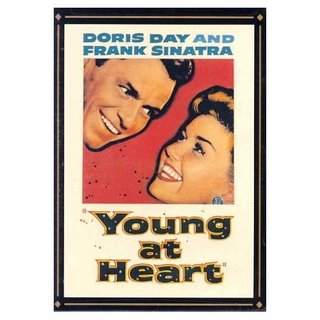 From the back-of-the-box blurb:
From the back-of-the-box blurb:Frank Sinatra, “The Chairman of the Board,” is swept off his feet by America’s Sweetheart, Doris Day, in this timeless love story.
A famous Broadway composer (Gig Young) surprises all when he proposes to small-town girl Doris Day. But no one could be more surprised when she chooses instead to elope with her fiance’s best friend, Frank Sinatra.
The first screen pairing of superstars Sinatra and Day, this Hollywood favorite will have your heart smilling and your toes tapping with timeless tunes from the Gershwins, Cole Porter and Johnny Mercer.
My toes tapped, but my heart did not smile. Frank plays a man suffering from severe depression with shades of delusional paranoia. Doris does not love him and marries him for exceedingly foolish reasons. They do not treat each other well, the audience knows that there is no way that this can end well, and on their first Christmas Eve together Frank attempts suicide. The ending, in which he has miraculously survived and they have forgiven each other and are now happy, is completely unsupported, tacked on, false. And what the title song has to do with the rest of the movie, I have no idea. It’s the least convincingly redemptive of the Christmas suicide movies, at least the ones I know:
It’s a Wonderful Life
The Apartment
Meet John Doe
I’d recommend any of these others, but not this one, Young at Heart, which I hadn’t known. (Are there others?)
It does have some lovely songs, though.
Friday, September 08, 2006
 A couple of years ago Alex Ross was singing the praises of Bjork’s album of vocal exploration, Medulla. When I found a used copy of the album, I picked it up. Featuring vocal beat-boxers, Icelandic choirs, and one of my favorite performers, Inuit throat-singer Tanya Tagaq, the album is a feast of vocals -- Bjork is no slouch herself in the vocal department.
A couple of years ago Alex Ross was singing the praises of Bjork’s album of vocal exploration, Medulla. When I found a used copy of the album, I picked it up. Featuring vocal beat-boxers, Icelandic choirs, and one of my favorite performers, Inuit throat-singer Tanya Tagaq, the album is a feast of vocals -- Bjork is no slouch herself in the vocal department. I had seen Tagaq twice at the Vancouver Folk Music Festival, and I saw her do two sets again at the Fest this year. Both sets brought tears to my eyes.
She’s the most genial and generous of performers. The first set I saw her with, she shared the stage with two of my faves, Najma and the singer/composer/pianist formerly known as Jane Siberry (now known as Issa, not, I hope, to be confused with the haiku poet Issa). As they all got settled Tanya made a point of approaching the other singers and warmly shaking their hands. They traded songs and they sang together, and Najma and Siberry sang beautifully, and Tagaq blew them away.
She builds her style on Inuit throat-singing and builds improvisations from there. Traditionally, the Inuit throat-singing style might not be considered a musical experience at all, but more of a game, where two women stand forehead-to-forehead, their hand’s behind each other’s heads, and try to make the other laugh as they chant the throaty breathing. The first two times I saw Tagaq at the Van Folk Fest, she included demonstrations of the game, and she always laughed -- she’s a joyful presence on stage.
As I said, Tagaq starts with the throaty breathing chant and builds from there. (A mainstream American equivalent might be if a singer were to develop a musical singing style based on the “hey batter hey batter hey batter batter batter” chatter of little-league and sandlot childhood infielders playing baseball.) Where she takes it is something to behold -- melodies and howls and screams and chants, with an unexpectedly beautiful and strong voice and a tremendous dramatic sense, evoking sex, birth, death, passion, love, compassion, suffering, joy. Incredibly powerful.
The next day I saw her do her “main stage” evening set. This tour she was with a sympathetically imaginative DJ and mixer, who gives good beats and loops her vocals effectively, neither creating huge riffs nor over-doing it, but doing it occasionally for dramatic emphasis. The last song she invited three virtuoso female vocalists to join her, women she met over the week-end festival, none of whose work I had heard before the week-end: a powerful but predictable blues singer from Toronto, a powerful and sophisticated Maori singer from New Zealand, and a powerful singer from somewhere in Europe -- it was a “United Colors” moment of Tagaq’s engineering, and before they started she gushed (she’s very gushy), “Have you ever seen three more beautiful women than these?”
Her mixer-DJ, Michael Red, laid down a beat and simple bluesy pre-recorded bass riff, and off they were, improvising, taking turns, singing together. I thought -- this is like an old-school jazz “cutting contest,” except they aren’t trying to show each other up, they’re trying to make something together. At one climactic moment, with all four of them wailing, Michael Red cannily dropped out, increasing the drama with his absence instead of trying to emphasize by doing something louder or more complex -- it was wonderful.
At the end of the song, the four singers collapsed in a group hug and jumped up and down together for a whole minute. They had DONE IT.
* * *
Tagaq’s recent album is fantastic, with wonderful clattering groove-less rhythms on a few songs from her husband’s traditional Basque percussion duo, and a cameo from Bjork on one song. It’s late, and I’ll let Bjork have the last word: she described Tagaq as “like Edith Piaf or something . . . totally emotional.”
Thursday, September 07, 2006
My beloved spouse is working evening meetings tonight; after dinner Fingers Hilarity led the two of us in a song of his own composition, a chanting sing-songy melody with strange words:
* * *
First day of pre-school yesterday (Wednesday) for him. My beloved spouse took him. He was apprehensive then he jumped right in and had a grand day of it. My spouse had planned to stay with him for half an hour, but she left after five minutes and had to get his attention to say good-bye.
These milestones are hard on parents -- the kid is growing up, bit by bit, preparing to leave us. For him, the milestones are about gaining power and competence and independence -- it's all excitement. For the parents, it's about loss as well as gain, and approaching mortality.
"Time goes faster as you get older; that means either we're having fun, or we pick up speed once we're over the hill."
* * *
The other day my son asked why I wanted to have him.
"Because I wanted to get to know you, because I love you," I said.
He looked sly and pained and thoughtful and said, "But didn't you love Mamu before I was born?"
"Yes, of course I did."
"But you wanted somebody else to love?"
"Yes, that's right."
He was satisfied with that.
* * *
Our last day in Michigan about a month ago, my sister drove us to the airport. My five-year-old niece asked for her favorite song from my sister's MP3 player, "the song about Jesus and Mrs. Robinson."
Fingers Hilarity: "Who's Jesus?"
His cousin: "He is our Savior."
Fingers: "What's a save-ee-yor?"
Cousin: "I don't know. Mom, what's a savior? No, wait, I know. Jesus was the Son of God, and after He died He rose from the dead."
Fingers: "And that makes him special, because other people when they die they don't rise up again."
My sister and I agreed, those were good answers.
* * *
They say the darnedest things!
* * *
At Bumbershoot -- Seattle's overpriced Labor Day week-end music festival -- we heard a good set from Laura Veirs and part of one from Sharon Jones before it was time to go home to bed. Sharon Jones is an old-school soul singer with a hot & funky horn band -- she was hot and I was sad to leave. Laura Veirs sings in an elegant melancholy; on record it's in a high-tech glossy deep sheen; live her music is scrawnier and clearer with easier-to-hear words, which is unusual. The songs neither benefit nor lose from the clearer words; I enjoyed the set.
* * *
Also at Bumbershoot the kid noticed some young people with brightly-colored spike mohawks. "Can I put one of those on my head?" he asked. The next day my beloved spouse set him up, and he loved it, but he hated washing it out at night and hasn't asked for it again since.

mailing the dinner songWe sang together and danced around the living room while a Mozart CD accompanied us (I liked the blend, and Mr. Hilarity didn't mind). We sang several renditions, and after each one, he "paid" me, handing me a slip of paper from a stack of coupons he lifted from the fridge. I might teach the song to my band.
mailing the dinner song
mailing the dinner song
mailing the dinner song
pushing the dinner song
pushing the dinner song
pushing the dinner song
pushing the dinner song
now you have to pay for the dinner song
stop
stop
stop
* * *
First day of pre-school yesterday (Wednesday) for him. My beloved spouse took him. He was apprehensive then he jumped right in and had a grand day of it. My spouse had planned to stay with him for half an hour, but she left after five minutes and had to get his attention to say good-bye.
These milestones are hard on parents -- the kid is growing up, bit by bit, preparing to leave us. For him, the milestones are about gaining power and competence and independence -- it's all excitement. For the parents, it's about loss as well as gain, and approaching mortality.
"Time goes faster as you get older; that means either we're having fun, or we pick up speed once we're over the hill."
* * *
The other day my son asked why I wanted to have him.
"Because I wanted to get to know you, because I love you," I said.
He looked sly and pained and thoughtful and said, "But didn't you love Mamu before I was born?"
"Yes, of course I did."
"But you wanted somebody else to love?"
"Yes, that's right."
He was satisfied with that.
* * *
Our last day in Michigan about a month ago, my sister drove us to the airport. My five-year-old niece asked for her favorite song from my sister's MP3 player, "the song about Jesus and Mrs. Robinson."
Fingers Hilarity: "Who's Jesus?"
His cousin: "He is our Savior."
Fingers: "What's a save-ee-yor?"
Cousin: "I don't know. Mom, what's a savior? No, wait, I know. Jesus was the Son of God, and after He died He rose from the dead."
Fingers: "And that makes him special, because other people when they die they don't rise up again."
My sister and I agreed, those were good answers.
* * *
They say the darnedest things!
* * *
At Bumbershoot -- Seattle's overpriced Labor Day week-end music festival -- we heard a good set from Laura Veirs and part of one from Sharon Jones before it was time to go home to bed. Sharon Jones is an old-school soul singer with a hot & funky horn band -- she was hot and I was sad to leave. Laura Veirs sings in an elegant melancholy; on record it's in a high-tech glossy deep sheen; live her music is scrawnier and clearer with easier-to-hear words, which is unusual. The songs neither benefit nor lose from the clearer words; I enjoyed the set.
* * *
Also at Bumbershoot the kid noticed some young people with brightly-colored spike mohawks. "Can I put one of those on my head?" he asked. The next day my beloved spouse set him up, and he loved it, but he hated washing it out at night and hasn't asked for it again since.


Coincident opinions culled from mostly recent reading:
Pauline Kael and Glenn Gould both referred to Barbra Streisand as "intense." In a good way. Right on.
Circa 1970, Jimmy Page and Robert Plant thought of Joni Mitchell as the best songwriter around. Dave Van Ronk thought of her as the best songwriter to emerge from the '60s folk music. "Best" is a lonely word, but she's one of them, no doubt.
When That Thing You Do came out, I was touched by the review in a local alt-weekly by Claire Dederer; her brother was in the popular band Presidents of the United States, and she spoke of how the scene of the bandmates going bananas the first time they heard their song on the radio really rang true. Recently Terry Teachout wrote, "Steven Kloves’ The Fabulous Baker Boys and Tom Hanks’ That Thing You Do both remind me so strongly of episodes from my own life that I can’t watch them without being plunged into autobiographical reverie." I really enjoyed the movie but heartfelt gratitude for its verisimilitude to life wasn't among my immediate reactions. It's great that Dederer and Teachout put that out there.
Wednesday, September 06, 2006

What name a city has -- What name a State, river, sea, mountain, wood, prairie, has -- is no indifferent matter. -- All aboriginal names sound good. I was asking for something savage and luxuriant, and behold here are the aboriginal names. I see how they are being preserved. They are honest words -- they give the true length, breadth, depth. They all fit. Mississippi ! -- the word winds with chutes -- it rolls a stream three thousand miles long. Ohio, Connecticut, Ottawa, Monongahela, all fit.
Names are magic. -- One word can pour such a flood through the soul. -- To-day I will mention Christ's before all other names. -- Grand words of names are still left. -- What is it that flows through me at the sight of the word Socrates, or Cincinnatus, or Alfred of the olden time -- or at the sight of the word Columbus, or Shakespeare, or Rousseau, or Mirabeau -- or at the sight of the word Washington, or Jefferson, or Emerson?
-- Walt Whitman, The Primer of Words, a/k/a An American Primer
I'm thinking of Whitman's encomium to aboriginal placenames because I've been listening to Bob Dylan, and I keep wanting to change the tag line of his song Mississippi, from Love and Theft, thus:
Only one thing I did wrong
Stayed in Pennsylvania a day too long
The song doesn't seem to have anything specifically and explicitly to do with Mississippi, but the name of that state has much more mythic resonance than the identically scanscioned "Pennsylvania." "Mississippi" evokes more than "Pennsylvania," because of the history and imagery, and also for the reasons Walt states above. But for me, the one thing it really evokes is Dylan's wish to be evocative.
Tuesday, September 05, 2006

Seattle's "liberal" paper is now carrying not one, but two columnists from the arch-conservative "National Review." Today Rich Lowry called on the Democrats to start proposing strategies for victory in Iraq.
Because, you know, the President doesn't have any.
Not that Lowry said that.
I love this idea that conservatives now have that the Bush is waiting with bated breath for military advice from the Democratic Party. Yeah, right.
Lowry also posits absurdly that there is no reason to oppose America's Iraq War while supporting America's Afghanistan War. Neglecting to mention that welcome guests of the latter country attacked the United States.
As it happens, I have opposed America's Afghanistan War from the beginning too. When Bush labeled it a "War on Terror," I knew he did not want to win it. Orwellian abstractions can never be defeated. People who fight them don't want to defeat them. They only want to war, war, war, war, war.
With this crowd, the War on Terror has been a "watch the birdie" distraction from the massive plundering of America's wealth by the government class and its business allies.
I do give Lowry points for brazen gall, calling the Democrats party of defeat. Bush is incapable of or uninterested in defending the national interest, and everything he has done since entering office has weakened our country in every way, not to mention having killed tens of thousands random Iraqis and Afghans. Bush has no interest in or strategy for "victory" of any sort -- except over the people of New Orleans and American government solvency and competence, and in this "war" he has been brilliantly successful. Some Democrats now -- belatedly -- say, "Let's cut the losses and get out of Iraq." They're only acknowledging the defecating elephant in the middle of the living room. Calling this defeatism, as Lowry does, requires imagination and a weak olfactory sense.
Someone named Guernica suggests a campaign to get Robert Christgau into the Rock Hall.
I’m down with that.
Cooperstown has room for play-by-play announcers. And that makes sense. A play-by-play announcer is an artist, a master story teller and poet who composes on the fly (so to speak) and whose job disallows stumbletonguetiedmumblebumming. A master of speech and of the lore of the sport.
A daily rock-pop critic is a musical equivalent -- and as it happens the Rock Hall does induct non-musicians -- I just looked it up after writing my opening paragraph!
Few people have been doing the rock-pop play-by-play longer or better than Christgau. I almost always enjoy reading him. His essay collection Grown Up All Wrong is one of the few such books I’ve read straight through. He listens with his whole self. Very ideological -- good left-liberal humanistic hedonism. And the hedonism disdains purism -- the purism of rock ideology especially, even though rock and roll is what he loves best (though I sometimes suspects he loves jazz even more). And his writing moves.
Now, the Rock Hall is silly. Rock and roll isn’t a sport -- it’s not just about statistics and wins and losses, there always has to be a story, and the story has to be Cool somehow. It can’t just be about music and it can’t just be about sales -- at least, that’s what the Rock Hall says. I’ve been to the Rock Hall. I enjoyed seeing Jimi Hendrix’s leather fringe jacket -- but not as much as I enjoyed seeing the Bronte sisters’ tiny gloves at the Morgan Library in New York once. The effluvia of the working life of recent celebrities -- it’s cool. But it’s still so close, it doesn’t excite me much. So, I’m not really a fan of the Rock Hall, but it would be a kick in the pants to see Christgau vindicated after having been fired “for taste” by the new owners of his main employer -- and besides, if any critic deserves it, he does. Does anybody even come close for length and breadth of coverage?
Christgau wouldn’t remember me, but I did meet him briefly once, and he was gracious, and we exchanged emails once, and he was very kind. He seems like a curmudgeon with a heart of gold. I like him immensely. I may complain hereabouts about this thing or that thing he may have said, but who cares -- arguing . . . arguing is part of life. I’m sure he wouldn’t disagree. Or maybe he would! And we could argue about it!
How vain and foolish for the “Village Voice” to have fired him. They may hire some good writers, but readers develop relationships -- usually one-sided -- with writers over time, and a regular columnist becomes something of a friend; readers become attached to favorite writers, and root for them to do well, and look forward to what they’ll do next. Even if the greatest writer in the world were to take Christgau’s place tomorrow, it would take her or him many years to create a similar relationship with readers. And readers value those relationships.
If you don’t know Christgau’s stuff, here’s a whole lot of it. If rockpop criticism were a sport, Christgau’s stats would blow everybody else away. He’s like McDonald’s, except not mass-produced or formulaic -- Over 12,000 reviewed!
Robert Christgau for the Rock and Roll Hall of Fame. Pass it on.
Friday, September 01, 2006
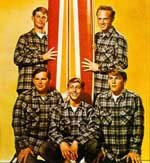 Labor Day week-end is upon us, which heralds the traditional end of summer, which seems a good time to think about the Beach Boys. Their early career leading up to “Pet Sounds” is among the most astonishing runs I know of. The sheer number of albums they put out from 1962 through 1965, check it out:
Labor Day week-end is upon us, which heralds the traditional end of summer, which seems a good time to think about the Beach Boys. Their early career leading up to “Pet Sounds” is among the most astonishing runs I know of. The sheer number of albums they put out from 1962 through 1965, check it out:1962: Surfin’ Safari
1963: Surfin’ USA
1963: Surfer Girl
1963: Little Deuce Coupe (8 new songs and 4 reissues)
1964: Shut Down Vol. 2
1964: All Summer Long
1964: Concert (no new songs, but a handful of new covers)
1964: Christmas Album (5 new songs and 7 covers)
1965: Today!
1965: Summer Days (and Summer Nights)
1965: Party! (no new songs but a bunch of new covers)
Even if you don’t count “Concert” and dock “Little Deuce Coupe” by half, that’s still nine and a half albums in a little over 3 years. The Beatles in the same period released 6 albums plus an album’s worth of singles -- but they had three songwriters and an arranger/producer versus the Beach Boys’ one -- Brian Wilson.
Quantity isn’t everything. (Even Mozart fanatics concede that there are some duds among the 180 CDs of his collected works.) But the Beach Boys’ quality in this period blankets me with sonic love.
I don’t remember those albums being available in the mid-’70s when I was first feeding the record addiction beast. Capitol was pushing their Beach Boys line through two two-record-set compilations culled from the period before “Pet Sounds,” Endless Summer and Spirit of America, one of the first records my brother and I ever bought. The two comps collected 43 songs (the CD releases add new tracks), a pretty good showing for what was basically a 3-year period, plus a few months (plus an odd but lovely 1969 single anomalously included).
But these 43 tracks don’t come close to exhausting the beauties of the Beach Boys’ first 11 albums. And so, here are my faves among the non-canonical Beach Boys songs in the period before “Pet Sounds.”
1962: Surfin’ Safari
Canonical songs: “Surfin’ Safari” and “409.”
Obscure classics:
“County Fair,” in which the 20-year-old Brian Wilson completely and charmingly mocks his own pretentions to machismo in this comic tale wherein the singer loses his girl at the eponymous fair to a muscle-man who can ring the bell with the hammer, all to a peppy beat & catchy tune.
“Chug-a-Lug,” in which the teen-age Beach Boys sing about their hobbies and chug-a-lugging root beer to another catchy number. Real teen music.
“Surfin’,” which I’m surprised wasn’t on either of the comps. Their first single, “baw baw bip ba dip ba dip.”
1963: Surfin’ U.S.A.
Canonical songs: “Surfin’ U.S.A.” and “Shut Down.”
Obscure classics:
“Stoked,” one of many surf-style instrumentals they recorded, their first original instrumental, and a good one.
“Lonely Sea,” Brian’s first falsetto ballad, and gorgeous. George Oppen complained about the poet H. D. telling the sea in one of her poems to “whirl up”; he wouldn’t have liked the Beach Boys.
1963: Surfer Girl, a classic album with no real filler.
Canonical songs: “Surefer Girl,” “Catch a Wave,” “Little Deuce Coupe,” “In My Room,” and “Hawaii.”
Obscure classics:
“The Rocking Surfer” and “Boogie Woodie,” a pair of instrumentals driven by Brian’s hoppin’ keyboards.
“The Surfer Moon,” another lovely Brian ballad and the first Beach Boys song with strings.
“South Bay Surfer,” the first of three times (that I know of) that Brian recorded the melody of Stephen Foster’s “The Old Folks at Home” (a/k/a “Way Down Upon the Swanee River”), this time with surfing lyrics. Dopey but charming with its bluff unison vocals.
“Our Car Club,” a harmonically dense (for 1963 rock) and rhythmically quirky driving song, heralding the new fad of the next record.
Obscure out-take included in the CD reissue: “I Do,” an ecstatic marriage song with an explosive Spector-esque chorus and gorgeous interweaving Beach Boys vocals.
1963: Little Deuce Coupe, a rushed concept album -- all the songs but one about cars -- with four of the 12 songs reissued from previous albums.
Canonical songs: 3 of the 4 reissued songs, plus “Be True to Your School,” “Spirit of America,” “A Young Man is Gone,” and “Custom Machine.”
Obscure classics: None that hadn’t appeared earlier. The other songs don’t bug me, but I don’t hanker to hear them again and again either.
1964: Shut Down Volume 2
Canonical songs: “Fun, Fun, Fun,” “Don’t Worry Baby,” “The Warmth of the Sun,” “This Car of Mine,” and “Why Do Fools Fall in Love.”
Obscure classic:
“Keep an Eye on Summer,” a wistful mid-tempo breezy thing patented B. Wilson yearning harmonies and falsetto.
1964: All Summer Long
Canonical songs: “I Get Around,” “All Summer Long,” “Hushabye,” “Little Honda,” “Wendy,” “Do You Remember?,” “The Girls on the Beach,” “Drive-In,” and “Don’t Back Down” -- 9 of the album’s 12 songs.
Obscure classic: Maybe my favorite song on the record, the gorgeous ballad of elopement, “We’ll Run Away,” in which the young lovers sympathetically relate how their parents eloped too as they tenderly forgive their parents’ hypocritical judgmentalism.
1964: Concert
Canonical song: “Graduation Day,” a close cover of a Four Freshmen song.
Obscure classics:
“Let’s Go Trippin’,” an adrenaline-hopped cover of the Dick Dale surf guitar classic, with Denny exuberantly rushing the drums, Carl hitting the guitar licks fine, and thousands of young girls screaming.
“Johnny B. Goode,” a swinging hip-rocking cover of the Chuck Berry classic.
1964: The Beach Boys’ Christmas Album
Canonical song: “Little Saint Nick” has become a Christmas classic, but it isn’t on either of the Beach Boys’ ‘70s comps.
Obscure classics: I’ll follow Capitol’s lead and will omit seasonal songs from this imaginary compilation I’m outlining, but I will say that “Santa’s Beard” and “Merry Christmas, Baby,” are 2 fine B. Wilson originals that capture some of the tender melancholy of the Season, that most of the string-laden covers of Christmas classics are gorgeous, and that the a cappella arrangement of “Auld Lang Syne” is stunning.
1965: Today!
Canonical songs: “Do You Wanna Dance,” “Good to My Baby,” “When I grow Up (To Be a Man),” “Help Me, Ronda,” “Dance, Dance, Dance,” and “Please Let Me Wonder.”
Obscure classics:
“Don’t Hurt My Little Sister,” a passionate and beautiful plea of brotherly love.
“Kiss Me Baby,” a 6/8 tune with those wonderful interweaving vocal lines.
“She Knows Me Too Well,” one of their more rhythmically alluring melodies, floating across and over barlines, simply and complexly beautiful.
“In the Back of My Mind,” a thickly recorded feature for Dennis who sings passionately, another beautiful melody.
1965: Summer Days (And Summer Nights!!)
Canonical songs: “Salt Lake City,” “Girl Don’t Tell Me,” “Help Me, Rhonda” (in a new, more canonical arrangement), “California Girls,” “Let Him Run Wild,” and “You’re So Good to Me.”
Obscure classics:
“Summer Means New Love,” a dreamy instrumental that could almost have fit on “Pet Sounds.”
“I’m Bugged at My Ol’ Man,” an intense doo-wop pastiche about parental abuse, intentionally sung out-of-key.
“And Your Dream Comes True,” a gorgeous a cappella tune based on “Bah Bah Black Sheep”; the “dream” of the title being marriage; one of Brian’s classic yearning-for-marriage songs, the third marriage song on our list here, and a perfect close to the album and our fictional alternative compilation . . .
Except . . .
. . . there’s one more album to go.
1965: Party!, their third album in a row with at least one exclamation mark in the title, and intended as place-holder filler until Brian completed “Pet Sounds,” but oddly one of my all-time favorite albums.
Canonical songs: the great surprising Top 10 hit “Barbara Ann” and “Tell Me Why,” a cover of a fairly obscure Beatles tune that I love way more than the original -- more swinging, more beautifully and passionately sung.
Obscure classics:
“Papa-Oom-Mow-Mow,” an obscure cover related to “Surfing Bird” that they recorded on their “Concert” album; this version is way better. Brian and Mike tear up the lead vocals, and I adore the core band of acoustic guitar, electric bass, and bongos.
“There’s No Other Like My Baby,” a glorious cover of a Phil Spector 6/8 ballad that falls into goofy joking by the end without obviating the gorgeousness. A fine close to any compilation.
That’s 24 songs, not counting the Christmas tunes -- enough for another two-record set as good as the other two.
Always with the Beach Boys, until the ‘70s anyway, there’s the unfathomable depth and mystery of their SOUND. The glorious golden tone.
I don’t mean to say they’re better than the Beatles. There are no comparatives in music you love. When you’re in the music, nothing else matters. There’s nowhere else you’d rather be. I realize that the Beach Boys are the height of rock nerd-boy sensibility, but I can’t help myself. I love those melodies and countermelodies and blends. And, you’ll note, the words are often poignant, almost always humane, often witty and playful. Sometimes I think that Brian and his team of lyricists were Chuck Berry’s truest heirs in the ‘60s -- so many songs detailing social life in little vignettes and narratives. From a more youthful, simpler, less critical perspective -- not saying the lyrics are as deep as Chuck’s, but they’re often surprisingly excellent.
So long, summer. See you next year.

